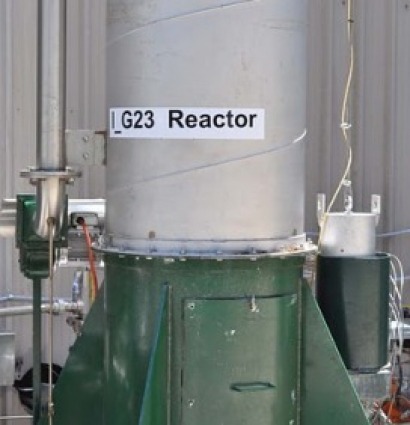
Virgin Australia has announced today that it has signed a Memorandum of Understanding (MoU) with biofuel developer, Licella, to support the commercialisation of a unique new process that converts biomass into sustainable aviation fuel.
The Australian invention, Catalytic Hydrothermal Reactor (CAT-HTR), uses water technology to produce high quality bio-crude oil from a wide range of different biomass, including agricultural and farm waste. While existing technologies require several processes to produce an aviation-quality biofuel, CAT-HTR only involves one step, without the use of expensive by-products or pre-treatment.
The process has been developed over the past three and a half years at Licella’s Pilot Facility in Somersby on the NSW Central Coast with guidance from Professor Maschmeyer of the University of Sydney. Under the MoU, Virgin Australia and Licella will jointly explore the potential of CAT-HTR through further testing of the aviation fuel the technology produces, with the aim of supporting its certification and reaching a commercial off-take agreement.
Virgin Australia Group Executive of Operations Sean Donohue said the MoU with Licella will enable Virgin Australia to further support the development of sustainable aviation biofuel.
“By pioneering the use of water technology, Licella’s CAT-HTR offers a clean, fast and cost-effective method of processing biomass. We were particularly drawn to Licella because its activities support Australian jobs, rural communities and our natural environment,” he said. “Virgin Australia’s strategy on sustainable aviation fuel is to work with a range of stakeholders across the industry. This is because we know creating a financially viable biofuel will require a variety of feedstocks and processes.”
“Licella‘s technology could potentially complement the variety of sustainable Australian feedstocks we are currently exploring, one of which being the mallee eucalypt tree”, Mr Donohue said.
The MoU comes as Federal Minister for Resources and Energy, the Hon. Martin Ferguson today officially opened a new Demonstration Plant, also in Somersby that will be dedicated to further developing CAT-HTR.
Licella CEO Steve Rogers said: “We are excited by the interest Virgin Australia has shown in Licella’s ATHTR process. With the opening of our new, potentially energy game-changing facility, along with Virgin Australia’s support, Licella is on its way to achieving its goal of producing 500,000bbls a year of bio-crude oil by 2015-16”.
Double deal for Licella
At the same time Virgin Australia, announced its support for Licella, Air New Zealand, a member of the Sustainable Aviation Fuel Users Group' (SAFUG) and the SAFUG Sustainable Aviation Fuel Road Map Australasian group, signed a similar MOU with the same company to develop its sustainable biofuel in New Zealand.
Air New Zealand Deputy CEO, Norm Thompson, said Air New Zealand has been collaborating with several parties to develop bio-derived sustainable fuels that can be used to progressively replace conventional aviation fuels, with a particular focus on developing a local aviation biofuel industry in New Zealand. “We are excited about signing the MOU with Licella to work more closely together to examine the potential commercialisation of their technology to produce sustainable biofuel in New Zealand,” said Thompson.
Air New Zealand has been at the forefront of aviation’s drive to create sustainable second-generation aviation biofuels which can be used as alternatives to the existing fossil based aviation fuels. The airline played an important role in the certification of sustainable aviation biofuels, with the data collected from the airline’s biofuel test flight in 2008 contributing to the certification of second-generation biofuels.
[Image: Licella's Catalytic Hydrothermal Reactor]
For additional information:

